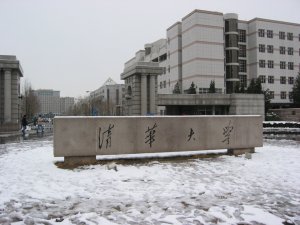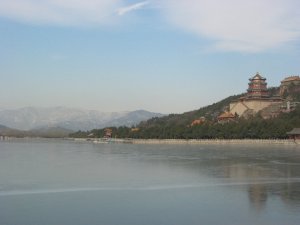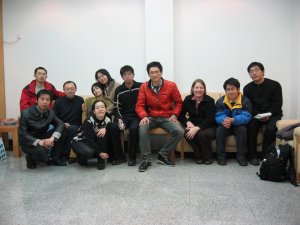|
ΒΞΆ¨W[i@Tsukuba Journal of Biology (2007) 6: TJB200705KI.
ΑWF »Ρlbg 2007Ck
Όϋ©·^ `AsOBiNet 2007 in Beijing`Ξμ@i}gεw@Ά½Β«Θw€ΘmΫφj
@Viewing from many sides, Japan has roots in China. For example, we use Kanji (Chinese characters), which was imported directly from China. Buddhism was also introduced into Japan via China. And many kinds of Japanese foods, cultures, and customs have origin in China. However, most of the Japanese people do not know what country China is in detail. This opportunity was a very good chance for us to know the now China. Of course, 4 days-trip was too short to understand other countries deeply, but all the things I saw and hear while I was staying in China were good hints for me to understand China. @First, I was surprised at the scenery of Beijing. I visited Beijing when I was a junior high school student. It was about 13 years ago. The impression of scenery of Beijing changed considerably comparing to the former one. Although the places I visited before were different from the ones in this trip, I felt that tall buildings, wide roads and traffic density increased. In addition, many buildings and railways were in the process of being built for the Olympic game in 2008. These changes imply the great energy and power of China and Chinese people. On the other hand, I saw many historical, old structures in Beijing, too. These structures had powerful auras, so they were still wonderful and beautiful even if they were small or surrounded by new tall buildings. I thought that Tsinghua University itself had the same character. As I will mention later, in Tsinghua University, so many new tall buildings and historical old structures stood together. It looks like a mixture of Tokyo and Kyoto in Japan. I felt the mind of Chinese people that treasure the old history and I also felt the frontier spirit of them.
@I sensed this frontier spirit in the conversations with Chinese friends. They said that most of the Chinese students who got degrees of Ph. D. wanted to find their jobs in USA or in other countries. It looked like natural for Chinese students to go abroad. Although many Japanese people with Ph. D. also go abroad, I don't know how much the proportion of them is in the total number of Ph. D.-takers in Japan. I think it is not "most of them". I suppose that this frontier spirit of Chinese people is not limited only in the modern scenery of Beijing and researcher's mind, but also in the economic world and it contributes to the remarkable development of China. @Tsinghua University is one of the highest level universities in China. The motto of Tsinghua University, "©s§@ϊΏΥ¨", means "Work hard always, and possess a high virtue that accepts everything" and it impressed me. I was surprised at the huge lot and many buildings. On the 2nd day of our trip, Prof. Wu and his students guided us in their campus. We walked about 3 hours, but the areas we saw were only some parts of Tsinghua University! We saw a beautiful pond, the statue of Kongzi (in Kanji, Eq), the place for the executive built on the basis of traditional Chinese architectural style. They are so tasteful that I felt like slipping into the old China. On the other hand, we saw modern, functional class rooms, the dormitories of students like condominiums and gorgeous main building. I thought that these new structures were the expression or outcome of expectations of the Chinese government to the students of Tsinghua University. I believe that the investment in education will link to developments of the country, so I think China will develop more and more in the future. @On the same day, we had a seminar and introduced our own studies or research one another. My own field is biology of mitochondria, and this field is not so wide, I think. Nevertheless, unexpectedly, we had an opportunity to listen to a research on genetics of mitochondria presented by Prof. Xu (McMaster Univ., Canada), who is one of the friends of Prof. Wu. It was an interesting research, and I noticed that there was much unfamiliar information for me even in my line. Our Chinese friends explained the studies on the biochemistry of algae. Under normal conditions, I seldom hear about studies outside my field. So, this was a valuable and meaningful chance. @During this trip, we visited places peculiar to China. Both of "The Forbidden City (in Japanese, Μ{ or Φι)" and "The Summer Palace (in Japanese, θσa)" were established by the emperors. They have hundreds years of history. The buildings still wore dignity and solemnity. I wondered that these places were really in the present-day metropolis, Beijing. And we appreciated the Beijing-Opera (). The picturesque costumes and characteristic voices of actors were very memorable. Through these experiences, I became more familiar with Chinese history and culture than before.
@We felt, got, and learned many things respectively through this wonderful trip. Among them, the most impressive thing for me was the kind friendship of Prof. Wu and his students. Prof. Wu customized the schedule of our trip and he was always concerned about us. In addition, not only Jo and Li, who visited Japan last year as a part of UNESCO program, but also the new Chinese friends warmly guided, instructed us. I'm not so good at English, but there were only a few inconveniences in the communication among us, I think. I guess that we were able to enjoy the conversation by the grace of the will to understand each other. I learned that this is the very mind we need when we communicate with people from other counties. Finally, I want to express my devout thanks to Prof. Wu, our Chinese friends, and Prof. Shiraiwa who had suggested me to join this trip, again.
Communicated by Yoshihiro Shiraiwa, Received March 26, 2007.
©2007 }gεwΆ¨wή
|


